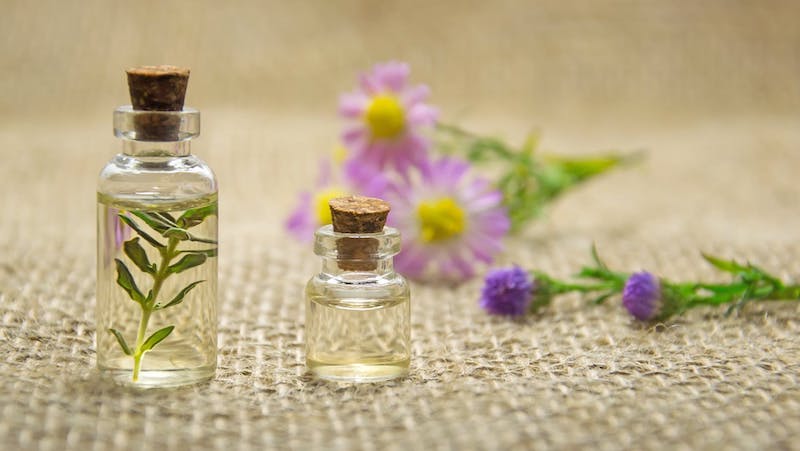While essential oils are often celebrated for their healing properties, their impact on acne-prone skin may not be as positive as many may think.
Although natural, essential oils are considered a potent sensitizing agent that can exacerbate existing acne breakouts and trigger new flare-ups.
And although the use of essential oils for spot-treating acne has gained popularity in recent years due to their touted anti-inflammatory and antibacterial properties, their application can easily backfire and result in further skin damage, including the appearance of permanent skin conditions, such as eczema.
Therefore, this article will delve into the complexities of using essential oils on acne, shedding light on the potential risks and why they might not be the best remedy for everyone and recommending safer alternatives that can still provide healing benefits for acne-prone skin, without exacerbating this inflammatory condition.

Can Essential Oils Help With Acne?
Using essential oils to help with acne isn’t the best idea, as their concentrated nature can be too irritating for the skin.
However, some essential oils, like tea tree oil, are known for their anti-inflammatory and antibacterial properties, which can help reduce acne flare-ups.
However, it is crucial to differentiate between the use of pure tea tree oil, which can be irritating and harmful to the skin due to its potency, and products specifically formulated with appropriate concentrations of tea tree oil that are safer for topical use.
Although pure essential oils are natural and smell nice, this doesn’t make them safe for application on the skin, especially compromised skin, which is the case with active acne.
Essential oils are potent fragrant components and, as such, are considered a common irritant that can potentially exacerbate inflammatory skin concerns rather than improve them.
Do Essential Oil Cause Acne?

Essential oils can exacerbate the severity of acne due to their sensitizing nature, which can cause the skin to become irritated, and thus further inflame acne flare-ups.
Additionally, essential oils are a common irritant that can dehydrate and sensitize the skin, causing it to overproduce oil to compensate for the dehydration and irritation.
This can lead to pore-clogging, which can not only exacerbate existing acne but cause new pimples to form down the line.
Furthermore, essential oils can be quite heavy for the skin and form an occlusive layer on its surface, trapping dirt and bacteria.
This can not only lead to infections, but can also result in the oil accumulating and hardening inside the pores, which will clog them and lead to more acne down the line.
Finally, essential oils are pretty much useless in skincare products, as they contain no vitamins, minerals, antioxidants, fatty acids, or triglycerides, which are primarily what our skin needs to remain clear and healthy.
They are present in a skincare product to mask the formulation’s natural (often bad) odor, make the product smell nice, and thus sell better.
While some essential oils have negligible antibacterial properties, they can still be sensitizing and irritating to sensitive and reactive skin.
Therefore, instead of risking it with a primarily fragrant component, opting for ingredients that offer proven skincare benefits is a much more effective way to reduce the appearance of acne.
Can Essential Oils Burn Skin?
Certain essential oils, particularly if used undiluted or incorrectly, can burn the skin and lead to irritation, rednessor even allergic reactions.
Some essential oils, especially citrus-based ones like lime, lemon, grapefruit, and bergamot, are also photosensitive or phototoxic, meaning they can trigger severe reactions if applied topically and then exposed to sunlight.
This is due to certain essential oils containing organic compounds called furanocoumarins.
When these oils are applied to the skin and then exposed to sunlight, the UV light triggers a chemical reaction with these compounds, leading to a toxic response on the skin, known as phototoxicity.
The reaction can cause serious skin inflammation that resembles an extreme sunburn, along with blistering and long-term discoloration.
Furthermore, some oils can cause a warming or hot sensation when applied to the skin.
If these “hot” oils aren’t properly diluted, they can cause skin reactions that can turn into severe redness, blistering, and peeling.
Additionally, most essential oils have the ability to cause contact dermatitis due to their fragrant nature and their ability to break down the cells.
The inflammatory response elicited from the topical application of essential oils breaks down the cell’s outer membrane, causing the nucleus (the cell’s brain) to die out, thus causing the cell to die.
But the worst part about this type of damage is that our skin can be very good at hiding when it’s being irritated internally.
So, even if you don’t notice an immediate reaction, the damage is likely still occurring beneath the skin’s surface, leading to concerns you will see much later.
Therefore, while essential oils can be considered therapeutic, they certainly come with a fair share of potential skin concerns, which makes them an unsuitable agent for treating any skin concerns, especially inflammatory conditions such as acne.
How to Use Essential Oils for Acne?
The best way to use essential oils for acne is to use products that contain an appropriately diluted concentration of essential oils to avoid any potential harm to the skin.
These products can be applied topically and may also include other beneficial ingredients, such as salicylic acid or niacinamide, to further target acne-prone skin.
It’s also essential to patch-test any product that contains essential oils onto a smaller area, such as the wrist or behind the ear, before using it on your entire face to ensure that your skin can tolerate it.
If redness, irritation, peeling, or flaking occurs within the first 24 hours after the patch test, this should be taken as a sign that the product is not suitable for your skin and should not be used again and in larger areas.
Additionally, avoid using essential oils near the eyes or on any open wounds, as they can cause severe irritation, skin burns, and permanent scarring.
Finally, avoid using products that contain essential oils in the morning, as they can increase your skin’s sensitivity to the sun and cause photosensitivity reactions that can lead to redness, irritation, and even scarring.
5 Essential Oil Alternatives You Can Use for Acne

Benzoyl Peroxide
Benzoyl peroxide is an antibacterial component that infuses the pores with oxygen to destroy the airless environment in which the acne-causing bacteria live.
This process helps reduce inflammation caused by bacterial overgrowth, soothes active acne, and prevents new breakouts from forming.
Effective in both wash-off and leave-on formulas, benzoyl peroxide is found in over-the-counter products in concentrations of up to 10%.
However, despite its effectiveness, it’s important to note that benzoyl peroxide can cause dryness and irritation, especially at higher concentrations or when used too frequently.
Therefore, it should be used cautiously, in moderate amounts and frequencies, and should be a part of a complete skincare regimen to minimize potential adverse effects.
RELATED: Does Benzoyl Peroxide Cause Purging?
Salicylic Acid
Salicylic acid is a beta hydroxy acid and a multifunctional ingredient that addresses several of the systemic causes of acne.
Its primary effect is as an exfoliant; however, salicylic acid can also penetrate into the pore lining and dissolve the accumulated cellular debris inside the pore, which makes it especially effective in reducing various types of acne, including whiteheads, blackheads, papules, pustules, and even cysts.
In addition to these benefits, salicylic acid also soothes irritated skin, evens out uneven skin tone, and refines uneven skin texture.
Mandelic Acid
Mandelic acid is an alpha-hydroxy acid (AHA) that is useful in treating common skin concerns such as hyperpigmentation and inflammatory and non-inflammatory acne.
Mandelic acid has a larger molecular weight, which means it works primarily on the skin’s surface, making it less irritating than more concentrated acids, such as glycolic acid.
However, mandelic acid can also dissolve cellular buildup near the opening of the pore and help soothe the inflammation that’s causing acne.
Additionally, mandelic acid has fewer side effects than stronger exfoliating acids and is also suitable for darker complexions.
Glycolic Acid
Glycolic acid is another alpha-hydroxy acid beneficial in treating various skin conditions, including both inflammatory and non-inflammatory acne.
With a smaller molecular weight and a water-soluble nature, which makes it best for working on the skin’s surface, glycolic acid aids in dissolving the bonds that hold dead skin cells together and encourages them to shed and make room for new, healthy cells underneath.
Additionally, glycolic acid has antibacterial properties, which make it effective at preventing the overgrowth of harmful bacteria on the skin and potential skin conditions these overgrowths can cause.
Finally, while glycolic acid is a stronger exfoliating acid, it’s generally well-tolerated in low concentrations of up to 10%.
However, individuals with darker complexions should exercise caution as glycolic acid can cause unwanted discoloration.
Retinoids
Retinoids are a class of vitamin A derivatives known for their diverse array of skincare benefits.
The primary advantage of retinoids is their ability to accelerate cellular turnover.
This means they help the skin shed dead cells more quickly and promote the growth of new ones, which results in less clogged pores and reduced acne, including more severe forms like nodules and cysts.
Apart from their acne-fighting abilities, retinoids also boost collagen production, which can improve the appearance of fine lines and wrinkles, as well as acne scarring, including atrophic scars and post-inflammatory hyperpigmentation.
However, despite these benefits, it’s important to note that retinoids are commonly associated with initial side effects such as dryness, peeling, and increased sensitivity to the sun.
Therefore, it’s recommended to use retinoids with caution and as a part of a complete skincare regimen that includes a gentle cleanser, a nourishing moisturizer, and a broad-spectrum sunscreen.
Niacinamide
Niacinamide is a potent antioxidant with anti-inflammatory properties, which makes it highly effective in treating inflammatory pimples.
Niacinamide also helps encourage the production of ceramides, which are naturally present moisturizing factors in the skin and components that help prevent dehydration, irritation, and overgrowth of bad bacteria by maintaining a strong and healthy skin barrier.
Finally, niacinamide also has melanin-inhibiting properties, which makes it useful in evening out uneven skin tone and helping to fade post-inflammatory hyperpigmentation left from acne.
My Product Recommendations for Acne-Prone Skin:
5 Best Sunscreens For Acne Prone Skin
10 Best Paula’s Choice Products For Acne-Prone Skin
6 Best Moisturizers For Acne-Prone Skin
5 Water-Based Moisturizers For Acne-Prone Skin
12 Best Anti-Aging Products For Acne-Prone Skin
References:

My name is Simone and I am a certified skin specialist. I created this website to teach my readers how to take great care of their skin and I also like to occasionally share my honest opinions on skincare products I’ve tried. You can learn more about me here.
